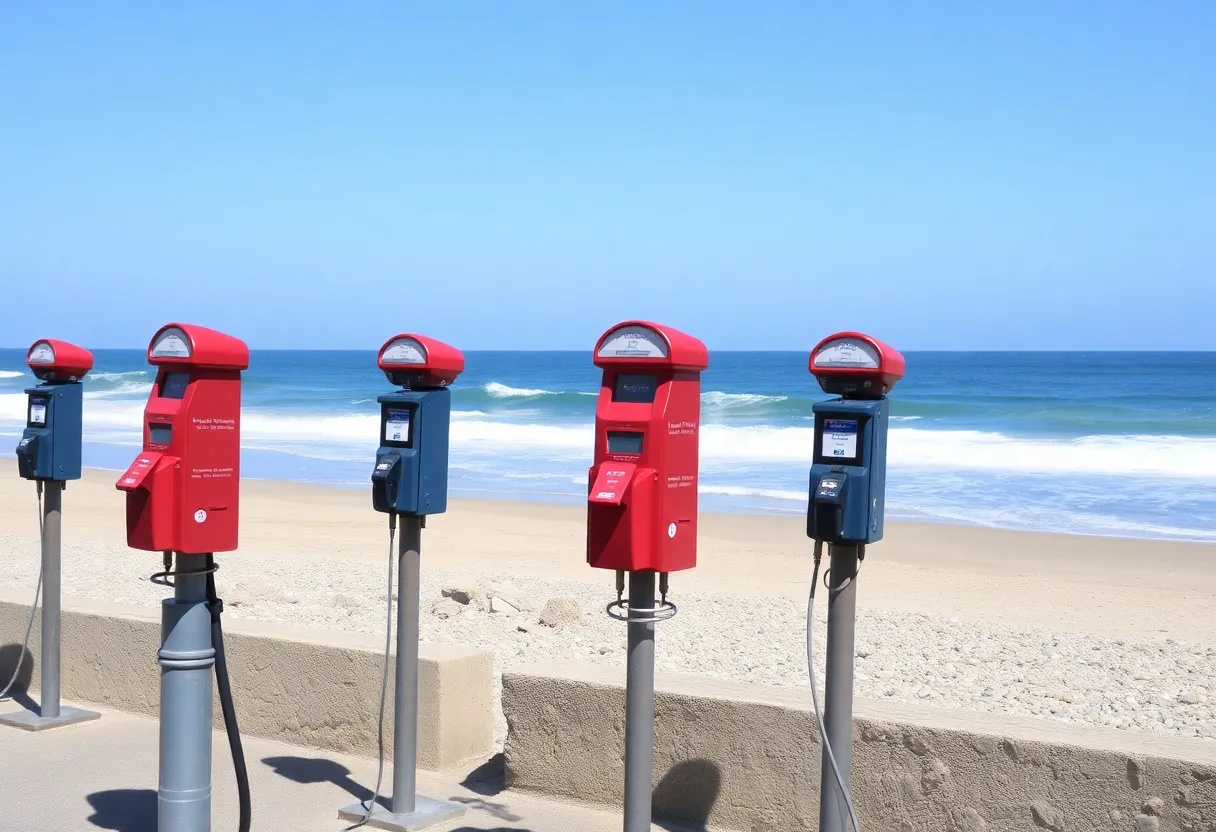

Parking meters in a beachside setting with ocean view.
Myrtle Beach, S.C. — A recent legal opinion from South Carolina Attorney General Alan Wilson has ignited discussions regarding the legality of municipalities employing private firms to handle parking violations. This opinion, prompted by queries from local officials in the Lowcountry region, asserts that “police power may not be delegated to private entities absent legislative or constitutional authority.” As a result, municipalities cannot delegate parking enforcement to private companies, according to Wilson.
This decision comes as a challenge for cities like Myrtle Beach, Surfside Beach, and North Myrtle Beach, which currently utilize private entities for parking services. Myrtle Beach officials responded to the opinion with a statement from Attorney Gene Connell, who emphasized its importance. Connell remarked, “They can say all they want to with it being ‘non-binding,’ this is a roadmap when we’re talking about what you should be doing when it comes to parking.”
Connell expressed multiple concerns over the implications of the attorney general’s opinion, particularly regarding due process for individuals who receive tickets from private enforcers. “You got someone who gets a ticket, they go to contest it, where do you contest it?” Connell questioned. “They don’t really have a right of redress, due process if you will.” He emphasized that it is unreasonable for private entities that issue parking tickets to profit from those violations, highlighting a significant conflict of interest.
This legal opinion may also impact those who have already been fined for parking violations. Myrtle Beach has seen substantial revenue from parking fines, collecting over $1 million in 2023 alone, which incorporates fees from both parking and court systems. During the summer of 2019, North Myrtle Beach reported collecting over $125,000 in parking tickets.
Most cities along the Grand Strand, including Myrtle Beach and its neighbors, charge between $2 to $5 per hour for parking, with fines for violations starting at $25. The dependency on private enforcement companies, such as Pivot Parking, has raised alarm among officials concerning the integrity and fairness of these practices.
In light of the attorney general’s opinion, Connell stated, “This particular opinion is a shot across the bow for every city that is trying to have a private entity collect for parking violations.” The ambiguity surrounding the issue has stirred uncertainty among municipal leaders, prompting a reconsideration of how parking enforcement should be structured.
With ongoing debates regarding legislative authority and public safety, local governments will likely continue discussing how to adjust their enforcement policies in light of Wilson’s recent ruling. The question of whether private companies can fairly manage parking enforcement while ensuring due process for ticketed individuals remains at the forefront of these discussions.
As Myrtle Beach, Surfside Beach, and North Myrtle Beach navigate the implications of this legal opinion, residents and visitors may experience changes in parking enforcement practices in the near future. The focus now turns to finding solutions that balance effective enforcement with fair treatment of individuals.
News Summary Spartanburg, South Carolina, is thrilled to welcome Milo's Tea Co.'s new $200 million…
News Summary In a thrilling game at Fifth Third Park, the Hub City Spartanburgers triumphed…
News Summary In a remarkable act of bravery, 14-year-old Amir Harris from Spartanburg saved his…
News Summary Spartanburg, S.C. is set to welcome its inaugural Vikings Vendor Market on April…
News Summary Seibels Bruce Insurance Company, a prominent figure in South Carolina's insurance sector since…
News Summary South Carolina has reached a remarkable $5 billion trade relationship with Canada, marking…